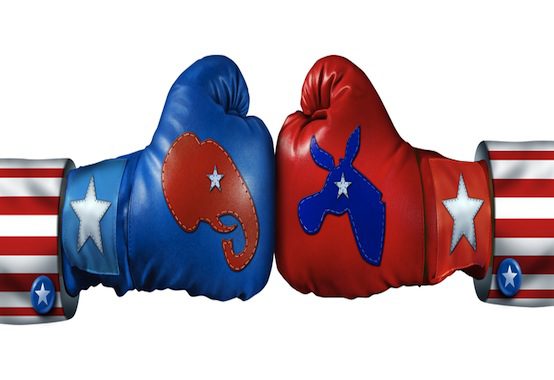Stop Overinterpreting the First Presidential Debate

There is no doubt that the complexion of this race changed significantly after the first debate between President Obama and a former Gov. Mitt Romney.
But why?
Was it the debate itself? Was it specifically those 90 minutes, during which Obama stammered and dozed, and Romney confidently sliced and diced? Put another way: did the debate alter the fundamentals of the race — or expose them?
I argue the latter.
Elections analyst Sean Trende explained how and why political observers had bought into the pre-debate illusion that Obama was in command of the race. Trende follows a long arc, so I’ll quote at length:
In the week ending June 18, we begin to see a spike in ad spending in swing states from the Obama campaign. This is the beginning of the “Bain Capital” assault. It pays some dividends, as the president captures a four-point lead just as the second spending push comes at the beginning of July.
But over time, gravity again takes over. By the end of July we are once more moving toward a tie. At the end of July and in early August, the White House begins hammering Romney over his tax returns; Harry Reid claims that the GOP nominee failed to pay any taxes in several years; and Priorities USA launches the ad with the steelworker implying that Romney was at least partially responsible for his wife’s death.
These conversations dominate early August, so much so that Team Romney feels obligated to make its vice presidential pick early lest it completely loses control of the narrative. This reverses the trajectory of the race, and by the end of the Republican National Convention, Romney has worked himself into a tie with the president. Of course, this is promptly reversed by the quite successful DNC.
But over time, we see gravity reassert itself. After the Benghazi attacks of Sept. 11, the president’s lead again begins to deteriorate. By the weekend, the tracking polls are suggesting some major movement against Obama. Gallup is moving toward a tie, and indeed might have shown the president trailing over the weekend of the 14th.
Then on Sept. 17, the “47 percent” video drops. Obama moves out to a four-point lead (note that something else big happens around that time). But once again, gravity takes over. Even before the first debate, Obama has seen the polls begin to close.
Let’s go back to the pre-summer default setting of this race — to the days before Romney had wrapped up the nomination, when he was seemingly desperately failing to dispatch underfunded has-beens like Rick Santorum. Obama supporters were preemptively spiking the ball then, too. Daily Kos-ite Jed Lewison said, “Desperate Republicans dream of Mitch Daniels as white night.” At Talking Points Memo, Brian Beutler wrote in February that positive economic news should “terrify Republicans.” Eric Boehlert of Media Matters chuckled that Fox News Channel appeared to be “somewhere between damage control and denial” about the likelihood of Obama’s reelection.
If such premature triumphalism seems silly now, the truth is it should have seemed silly then. As of March, Rasmussen had Mitt Romney and Rick Santorum polling ahead of Obama. Let me repeat that so it sinks in: at one point in this election year, a plurality of voters registered a preference for Rick Santorum over President Obama.
The first debate did not suddenly catapult Mitt Romney into contention. Rather, it was the moment where he finally captured the momentum that any Republican nominee could have enjoyed this fall.
I should note that not all liberals were blind to this reality. Jamelle Bouie said this back in March:
Supporters of the president should put the champagne away for now; the electorate is close to evenly divided, and regardless of who wins the Republican presidential contest, the eventual nominee will have a good shot at winning the presidency. Recent events have obscured this, but the simple fact is that the 2012 election will be close.
I might as well toot my own horn while I’m at it. I too wrote in March:
The election is going to be a nail-biter. It will turn on the fickle affections of a narrow sliver of independents whom I’ve called Oscillating Low-Information Voters. We simply cannot know in advance how such voters will feel on Election Day.
My advice: Stop watching the whiplash-inducing daily tracking polls. Don’t bite on Matt Drudge’s “shock poll” bait. Resign yourself to the fact that you won’t know who the next president is going to be until the morning of November 7 — and maybe not even then.
Comments